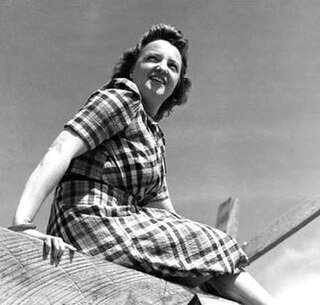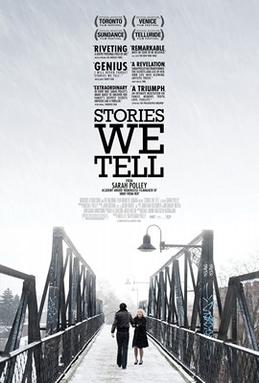Related Research Articles

The National Film Board of Canada is a Canadian public film and digital media producer and distributor. An agency of the Government of Canada, the NFB produces and distributes documentary films, animation, web documentaries, and alternative dramas. In total, the NFB has produced over 13,000 productions since its inception, which have won over 5,000 awards. The NFB reports to the Parliament of Canada through the Minister of Canadian Heritage. It has bilingual production programs and branches in English and French, including multicultural-related documentaries.
Sarah Marshall Kernochan is an American documentarian, film director, screenwriter and novelist. She is the recipient of several prestigious awards, including two Academy Awards
Caroline Leaf is a Canadian-American filmmaker, animator, director, tutor and artist. She has produced numerous short animated films and her work has been recognized worldwide. She is best known as one of the pioneering filmmakers at the National Film Board of Canada (NFB). She worked at the NFB from 1972 to 1991. During that time, she created the sand animation and paint-on-glass animation techniques. She also tried new hands-on techniques with 70mm IMAX film. Her work is often representational of Canadian culture and is narrative-based. Leaf now lives in London, England, and is a tutor at The National Film and Television School. She maintains a studio in London working in oils and on paper and does landscape drawing with an iPad.

Ryan Larkin was a Canadian animator, artist, and sculptor who rose to fame with the psychedelic Oscar-nominated short Walking (1968) and the acclaimed Street Musique (1972). He was the subject of the Oscar-winning film Ryan.

Laura Boulton was an American ethnomusicologist. She is known for the many field recordings, films and photographs of traditional music and its performances and practitioners from Egypt, the Sudan, Uganda, Kenya and Tanganyika. Boulton also collected traditional musical instruments around the world. In her work with the National Film Board of Canada (NFB) during the Second World War, she is recognized as being a pioneer for women who work in the film industry.
Flamenco at 5:15 is a 1983 short documentary film directed by Cynthia Scott, taking audiences inside a flamenco dance class at the National Ballet School of Canada. Produced by Studio D, the women's unit of the National Film Board of Canada, the film won an Oscar at the 56th Academy Awards in 1984 for Documentary Short Subject.
Ben Addelman is a Canadian filmmaker. He is known for directing five documentaries: Discordia, Bombay Calling, Nollywood Babylon, Kivalina vs. Exxon, and Plastic People.
Paul Cowan is a Canadian filmmaker who spent the bulk of his career with the National Film Board of Canada.
Beverly Shaffer is a filmmaker in Montreal, Quebec, Canada. Shaffer spent the bulk of her professional career with the National Film Board of Canada (NFB), directing short documentaries and dramas. Her documentary I'll Find a Way, about a young girl with spina bifida, won the 1977 Academy Award for Best Live Action Short Film.
Jane Marsh Beveridge was a Canadian director, producer, editor, composer, screenwriter, teacher and sculptor. She was best known as one of the pioneering filmmakers at the National Film Board of Canada (NFB).
Wendy Tilby and Amanda Forbis are a Canadian animation duo. On January 24, 2012, they received their second Oscar nomination, for the National Film Board of Canada (NFB) animated short film, Wild Life (2011). With their latest film, The Flying Sailor, they received several nominations and awards, including for the Best Canadian Film at the Ottawa International Animation Festival, and on January 24, 2023, they received a nomination for the 95th Academy Awards under the category Best Animated Short Film.

Stories We Tell is a 2012 Canadian documentary film written and directed by Sarah Polley and produced by the National Film Board of Canada (NFB). The film explores her family's secrets—including one intimately related to Polley's own identity. Stories We Tell premiered August 29, 2012 at the 69th Venice International Film Festival, then played at the 39th Telluride Film Festival and the 37th Toronto International Film Festival. In 2015, it was added to the Toronto International Film Festival's list of the top 10 Canadian films of all time, at number 10. It was also named the 70th greatest film since 2000 in a 2016 critics' poll by BBC.
Gudrun Johanna Bjerring Parker was a Canadian filmmaker, writer, and producer. She worked on films with the National Film Board of Canada (NFB) during the Second World War and in the early 1950s. Parker wrote the script for The Stratford Adventure, which was nominated for an academy award, and directed part of Royal Journey, which won a BAFTA. She married fellow NFB filmmaker Morten Parker. They often worked as a team on films and in 1963, they established a production company, Parker Film Associates.
The Masculine Mystique is a Canadian docufiction film directed by Giles Walker and John N. Smith and released in 1984.
Claire Prieto is a Canadian film director and producer, known as one of the first black filmmakers in Canada. Along with Roger McTair, Prieto was a partner in the Toronto-based production company, Prieto-McTair Productions, which operated from 1982 to 2007.

Marianna Yarovskaya is a Russian-American documentary filmmaker who is the director and producer of the 2018 Academy Award short-listed documentary film Women of the Gulag based on the book Women of the Gulag: Stories of Five Remarkable Lives by Paul Roderick Gregory (2013). She also produced Greedy Lying Bastards (2012).

Julia Bell Reichert was an American Academy Award-winning documentary filmmaker, activist, and feminist. She was a co-founder of New Day Films. Reichert's filmmaking career spanned over 50 years as a director and producer of documentaries.

Studio D was the women's unit of the National Film Board of Canada (NFB) and the world's first publicly funded feminist filmmaking studio. In its 22-year history, it produced over 140 films and won 3 Academy Awards. Cinema Canada once called it the "Jewel in the Crown Corporation."
Grierson is a 1973 documentary directed by Roger Blais for the National Film Board of Canada (NFB). It won, among other awards, the 1974 BAFTA Award for Best Documentary.
Malca Gillson (1926-2010) was a Canadian filmmaker with the National Film Board of Canada, and one of the first women to join the NFB in a non-junior position. She was a multi-tasker, acting as composer, sound editor, editor, producer and director. She is best known for her ground-breaking trilogy about end-of-life care: The Last Days of Living, Reflections on Suffering and Time for Caring.
References
- ↑ "Rca-arc.ca". Archived from the original on 4 May 2019. Retrieved 29 March 2016.
- 1 2 Oscars.org
- 1 2 3 4 5 6 "Tiff.net". Archived from the original on 8 September 2015. Retrieved 10 March 2016.
- ↑ Fontana, Christine (4 March 2019). "Dark for Art's Sake". New Orleans Living Magazine. Retrieved 3 November 2024.
- 1 2 3 4 Femfilm.ca
- 1 2 3 4 5 6 7 8 "Sarah Kernochan - Women & Film - Interviews". www.sarahkernochan.com. Retrieved 29 October 2019.
- 1 2 "Academy.ca". Archived from the original on 10 March 2016. Retrieved 10 March 2016.
- ↑ Bruce Bailey, "Montrealers have high hopes for Oscar gold". Montreal Gazette , March 20, 1982.
- ↑ Aftaab. "Home". WIDC. Retrieved 29 October 2019.
- ↑ "Movie Reviews". The New York Times . Archived from the original on 10 September 2017.
- 1 2 3 "Tiff.net". Archived from the original on 8 September 2015. Retrieved 10 March 2016.
- 1 2 Canada, National Film Board of, First Winter , retrieved 29 October 2019
- ↑ "Academy Awards Acceptance Speeches - Search Results | Margaret Herrick Library | Academy of Motion Picture Arts & Sciences". aaspeechesdb.oscars.org. Retrieved 29 October 2019.
- ↑ Sarahkernochan.com
- ↑ "Cynthia Scott -- femfilm.ca: Canadian Women Film Directors Database". femfilm.ca. Retrieved 29 October 2019.
- 1 2 "Cynthia Scott: Oscar Winner, Dunany Lover. – Dunany". 24 July 2018. Retrieved 29 October 2019.
- ↑ "Tiff.net". Archived from the original on 15 September 2015. Retrieved 10 March 2016.
- ↑ Aqcc.ca